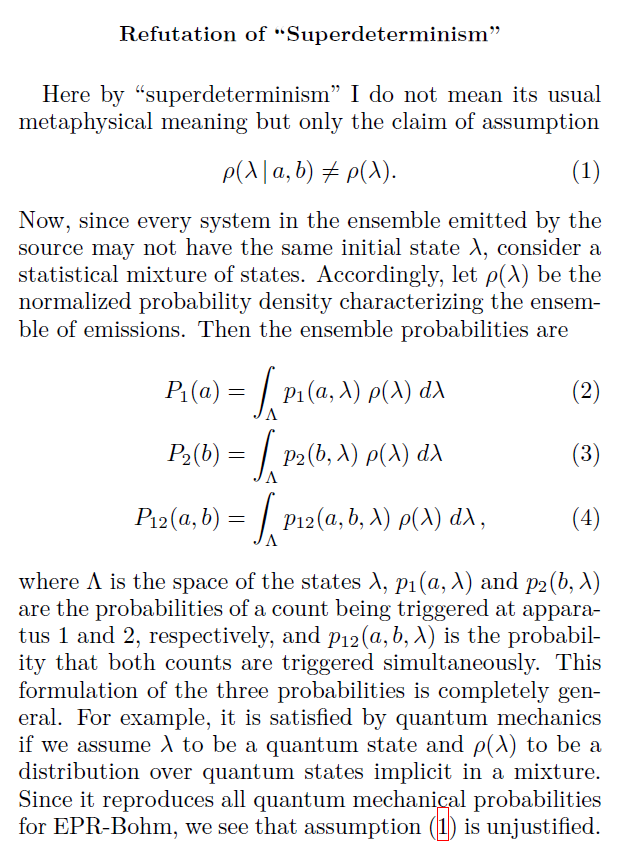I am reproducing my refutation of superdeterminism from this thread because it seems to be getting lost in that thread in some tangential noise:

Happy New Year!
.

Fred: superdeterminism is proposed by anti-Bellists like Tim Palmer and Sabine Hossenfelder. They do believe that Bell’s theorem as mathematics is a true theorem, but they believe it is irrelevant. Bell fanatics like me think that superdeterminism is a logical possibility not worth serious consideration since it explains everything while having no predictive power.FrediFizzx wrote: ↑Fri Dec 31, 2021 3:47 am Yeah, good idea. The Bell fanatics like to engage in pure nonsense all the time! But that is a really good refutation.
Happy New Year!
I knew you wouldn't be able to resist posting that nonsense on this forum.gill1109 wrote: ↑Fri Dec 31, 2021 9:08 pm ... Other news. Brian Sanctuary and I are holding a new 5000 Euro bet. He believes that *he* is going to disprove Bell’s theorem *and* be recognised for having done so by the majority of physicists. Join in the conversation at https://gill1109.com/2021/12/22/the-bel ... challenge/
Alice and Bob choose their settings: “a” and “b” respectively. In an ideal EPR-B experiment, a particle always arrives at both Alice and Bob’s measurement devices. There are always detection events on both sides of the experiment. So I don’t understand your (2), (3) and (4). I don’t understand what are p_1(a, lambda), p_2(b, lambda), p_12(a, b, lambda).Joy Christian wrote: ↑Sat Jan 01, 2022 2:29 amNo, that is incorrect.
a and b in the above refutation are experimental settings, such as angles specifying the orientations of the analyzers.
.
They are defined in Section II, equations (1) and (2) of Clauser and Horne: https://doi.org/10.1103/PhysRevD.10.526. As a self-proclaimed "expert", you should not have had any difficulty understanding the equations of Clauser and Horne, published in their famous paper of 1974. You are a fake "expert."gill1109 wrote: ↑Sat Jan 01, 2022 11:18 amAlice and Bob choose their settings: “a” and “b” respectively. In an ideal EPR-B experiment, a particle always arrives at both Alice and Bob’s measurement devices. There are always detection events on both sides of the experiment. So I don’t understand your (2), (3) and (4). I don’t understand what are p_1(a, lambda), p_2(b, lambda), p_12(a, b, lambda).Joy Christian wrote: ↑Sat Jan 01, 2022 2:29 amNo, that is incorrect.
a and b in the above refutation are experimental settings, such as angles specifying the orientations of the analyzers.
.
The Clauser-Horne paper is about the detection loophole, and about early experiments in which the outcomes were not “plus”, “minus”, or “no detection”, but only “plus” or “no detection”.Joy Christian wrote: ↑Sat Jan 01, 2022 1:11 pmThey are defined in Section II, equations (1) and (2) of Clauser and Horne: https://doi.org/10.1103/PhysRevD.10.526. As a self-proclaimed "expert", you should not have had any difficulty understanding the equations of Clauser and Horne, published in their famous paper of 1974. You are a fake "expert."gill1109 wrote: ↑Sat Jan 01, 2022 11:18 amAlice and Bob choose their settings: “a” and “b” respectively. In an ideal EPR-B experiment, a particle always arrives at both Alice and Bob’s measurement devices. There are always detection events on both sides of the experiment. So I don’t understand your (2), (3) and (4). I don’t understand what are p_1(a, lambda), p_2(b, lambda), p_12(a, b, lambda).Joy Christian wrote: ↑Sat Jan 01, 2022 2:29 am
No, that is incorrect.
a and b in the above refutation are experimental settings, such as angles specifying the orientations of the analyzers.
.
Note also that my refutation of "superdeterminism" is in response to Michel's claim that he is only assuming p(h | a, b) =/= p(h) [my eq. (1) above] without committing to its usual interpretation of superdeterminism. What I have shown is that Michel's claim is wrong. The assumption p(h | a, b) =/= p(h) is not required for reproducing quantum mechanical probabilities, unless one is explicitly committed to either superdeterminism or retrocausality, or both.
“Complete hogwash”. Now there’s a subtle argument. Hm… have to think about those wise words.Joy Christian wrote: ↑Sat Jan 01, 2022 10:33 pm Complete hogwash. You always have stupid things to waffle about everything. I am not going to worry about what you delude yourself with.